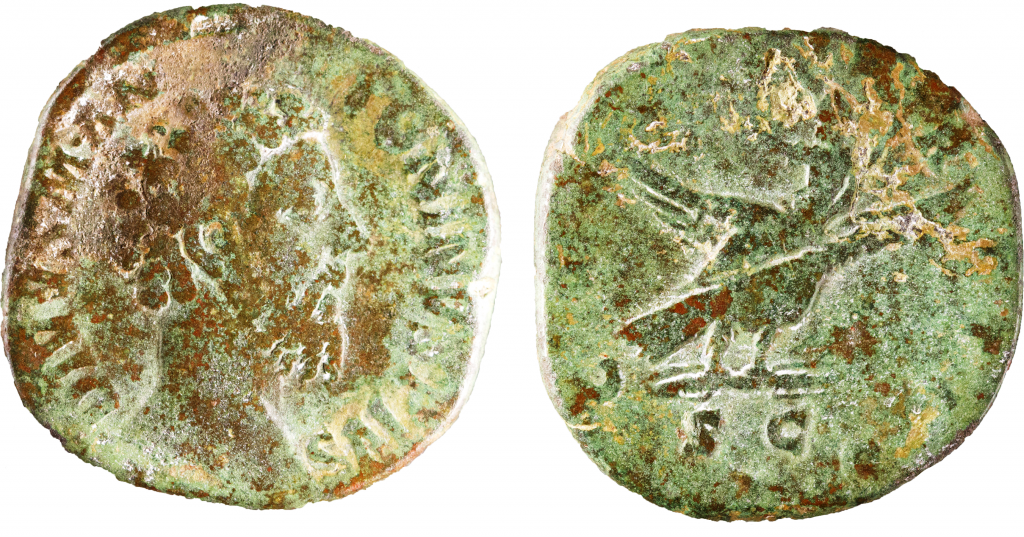March 17, 2015, by Will Leveritt
On this day in 180AD the Roman emperor Marcus Aurelius died
Text by Mike Welbourn
Image by Kelly Grimshaw and Katy Davies
On this day, the 17th of March in AD 180, the sixteenth emperor of Rome, Marcus Aurelius Antoninus, died at Sirmium in the province of Pannonia (modern day Sremska Mitrovica, Serbia). He was 58 years old and had ruled for exactly nineteen years and ten days. He was rare among emperors in having died in the provinces, on the northern border of his empire. Up to that time only Trajan had met his end outside of Italy, in the city of Selinus, Cilicia. The reason Marcus ended his days so far from Rome is straightforward enough: war.

AE sestertius issued under Commodus. Obverse has bare head of Marcus Aurelius right, DIVVUS M ANTONINVS PIVS. Reverse has Marcus Aurelius (with beard indicated) riding on back of eagle heavenward. CONSECRATIO / SC. 21.81g, 30mm, 6 o’clock. Coin courtesy of the University of Nottingham Museum.
Marcus was obliged to spend the majority of his reign fighting back Germanic tribes attempting to invade from the north. The trouble began in 167, when two Germanic tribes – the Obii and the Langobardi – forced their way into Pannonia, and these wars would occupy Marcus on-and-off for the rest of his reign. Generally the Roman’s military campaigns met with success, and the defeated barbarians would seek to make peace with the empire, only for fighting to break out afresh some time later.
Marcus had returned to Rome, for what would turn out to be the last time, in autumn 176. The next year, 177, his son and eventual successor, Commodus, was made consul and co-emperor with his father, aged just 15. During this respite from war, the two Augusti focussed their energies on various domestic issues. But that same year the barbarian threat returned, and Marcus travelled north once more in the late summer of 178.
In the campaigning which followed his return to the frontier, victories were won, with particular attention paid to the powerful tribes of the Jazyges, Quadi, and Marcomanni. It seems that Marcus intended to take over their territories and transform them into new Roman provinces. Roman successes meant that this goal was far from unattainable.
Unfortunately, in March of 180, just before the latest campaign season was about to begin, the emperor’s health deteriorated rapidly. He sent for Commodus, in a bid to encourage his son to carry on the war and complete the mission Marcus now could not. He sent his son away (which may suggest that he had contracted the plague then said to be working its way through the army). Whatever the precise cause of death, the emperor breathed his last on 17th March.
His last words, according to the senator and historian Cassius Dio, were directed at the military tribune who asked for the watchword: ‘Look to the rising sun; for I am already setting’. After his death, various honours were voted to him, including, so Dio claims, a golden statue of the emperor which was set up in the senate house itself. He was also deified by the senate – that is, added to the pantheon of Roman gods – an event to which the coin shown above makes reference.
Unfortunately, Marcus’ plan to expand the northern borders of his empire came to naught: Commodus succeeded his father, but being young and more attracted to high and easy living, abandoned his father’s scheme, made a peace with the barbarians, and returned to Rome not long after Marcus’ death. It may also be the case, however, that the cadre of experienced advisors and military men whom Marcus had left to aid his son advocated this move, seeing little to be gained from adding such fractious tribes to the Roman Empire.
No comments yet, fill out a comment to be the first

Leave a Reply